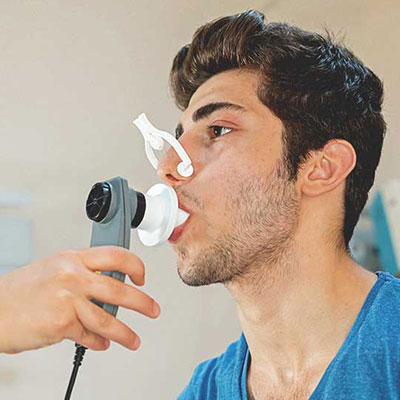
The Pulmonary function test (PFT) measures the functioning of the lungs.
Why is a PFT performed?
Pulmonary function tests are done to:
- Diagnose certain types of lung disease, such as asthma, bronchitis, and emphysema
- Find the cause of shortness of breath whether it is obstructive or restrictive.
- Measure whether exposure to chemicals at work affects lung function.
- Check lung function before surgery.
- Measure progress in disease treatment.
- If already diagnosed with asthma or COPD spirometry, it can determine if the current treatment is effective.
What happens during a PFT?
You will be asked to blow (out & in) through a tight-fitted mouthpiece. The values will be recorded in the system.
Indications
Spirometry indicates the functioning of the lungs through the most common measurements that include:
- Forced Vital Capacity (FVC) – The largest amount of air one can blow out after you take the biggest breath in.
- Forced Expiratory Volume (FEV1) – The amount of air one can blow out of one’s lungs in the first second.
- If the amount of air one can blow out in the first second is low then, lung disease such as asthma or COPD is suspected.
How to prepare for PFT
- Don’t eat a heavy meal right before the test,
- Avoid caffeinated foods or drinks.
- Don’t smoke or exercise strenuously for six hours before the test.
- On the day of the test, wear loose clothing that won’t restrict your breathing, and wear dentures to the testing if you normally wear them.
